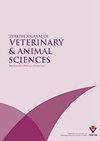Genetic polymorphism of alpha S1-casein in Bulgarian sheep breeds and its effect on milk composition
IF 0.6
4区 农林科学
Q4 VETERINARY SCIENCES
引用次数: 0
保加利亚绵羊品种α s1 -酪蛋白遗传多态性及其对乳成分的影响
本文章由计算机程序翻译,如有差异,请以英文原文为准。
求助全文
约1分钟内获得全文
求助全文
来源期刊
CiteScore
1.30
自引率
0.00%
发文量
57
审稿时长
24 months
期刊介绍:
The Turkish Journal of Veterinary and Animal Sciences is published electronically 6 times a year by the Scientific and Technological Research Council of Turkey (TÜBİTAK).
Accepts English-language manuscripts on all aspects of veterinary medicine and animal sciences.
Contribution is open to researchers of all nationalities.
Original research articles, review articles, short communications, case reports, and letters to the editor are welcome.
Manuscripts related to economically important large and small farm animals, poultry, equine species, aquatic species, and bees, as well as companion animals such as dogs, cats, and cage birds, are particularly welcome.
Contributions related to laboratory animals are only accepted for publication with the understanding that the subject is crucial for veterinary medicine and animal science.
Manuscripts written on the subjects of basic sciences and clinical sciences related to veterinary medicine, nutrition, and nutritional diseases, as well as the breeding and husbandry of the above-mentioned animals and the hygiene and technology of food of animal origin, have priority for publication in the journal.
A manuscript suggesting that animals have been subjected to adverse, stressful, or harsh conditions or treatment will not be processed for publication unless it has been approved by an institutional animal care committee or the equivalent thereof.
The editor and the peer reviewers reserve the right to reject papers on ethical grounds when, in their opinion, the severity of experimental procedures to which animals are subjected is not justified by the scientific value or originality of the information being sought by the author(s).

 求助内容:
求助内容: 应助结果提醒方式:
应助结果提醒方式:


